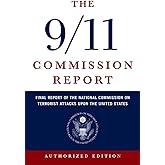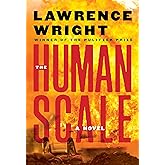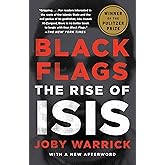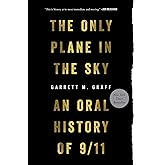
Download the free Kindle app and start reading Kindle books instantly on your smartphone, tablet, or computer - no Kindle device required.
Read instantly on your browser with Kindle for Web.
Using your mobile phone camera - scan the code below and download the Kindle app.



 Audible sample
Audible sample Follow the author
OK
The Looming Tower: Al-Qaeda and the Road to 9/11 Spiral-bound
- Print length540 pages
- LanguageEnglish
- PublisherGeneric
- Dimensions1.6 x 6.6 x 9.5 inches
Book recommendations, author interviews, editors' picks, and more. Read it now.
Customers who viewed this item also viewed
 The 9/11 Commission Report: Final Report of the National Commission on Terrorist Attacks Upon the United StatesNational Commission on Terrorist AttacksPaperback
The 9/11 Commission Report: Final Report of the National Commission on Terrorist Attacks Upon the United StatesNational Commission on Terrorist AttacksPaperback
Product details
- ASIN : B09PGQ3448
- Publisher : Generic
- Language : English
- Print length : 540 pages
- Item Weight : 1.7 pounds
- Dimensions : 1.6 x 6.6 x 9.5 inches
- Customer Reviews:
About the author

Discover more of the author’s books, see similar authors, read book recommendations and more.
Customer reviews
Customer Reviews, including Product Star Ratings help customers to learn more about the product and decide whether it is the right product for them.
To calculate the overall star rating and percentage breakdown by star, we don’t use a simple average. Instead, our system considers things like how recent a review is and if the reviewer bought the item on Amazon. It also analyzed reviews to verify trustworthiness.
Learn more how customers reviews work on AmazonCustomers say
Customers find the book well-researched and easy to read, with a concise writing style that reads like a field report. They appreciate its comprehensive background and detailed biographies of key characters, describing it as a fascinating look at Al-Qaeda's origins. The narrative quality receives positive feedback, with one customer noting it as an incredible history lesson of worlds colliding. The book's scariness level receives mixed reactions, with some finding it frightening.
AI-generated from the text of customer reviews
Customers find the book highly informative and well-researched, with one customer noting how the author provides great detail into the lives of the subjects.
"This is a thoroughly researched book that describes the family background, recent history, and influences on Osama bin Laden, the beginning of al-..." Read more
"Well-researched and based on a carefully constructed timeline, The Looming Tower reveals facts about the rise of al-Qaeda and the 9/11 attacks that..." Read more
"...not just the history of the terrorist, but the fascinating if disturbing history of Saudi Arabia and other parts of the Middle East, where religion..." Read more
"...The richness of its new information, and the depth of its perceptions can help us deal more wisely and effectively with the continuing terrorist..." Read more
Customers find the book highly readable and worth their time, describing it as an extraordinary document that must be read by every American.
"...serious threat facing the West in the 21st Century and an immensely satisfying read... Captivating!" Read more
"...The central tragic figure in the book is John O'Neill, the brilliant, swaggering but restless and tormented FBI agent who was desperate to snare Bin..." Read more
"...Why is this book so good?..." Read more
"One to read and share. Tuck this knowledge away for the future." Read more
Customers appreciate the writing quality of the book, describing it as concise and easy to read, with one customer noting it reads almost like a field report.
"...Third and finally, Wright can write. The narrative rushes along, pulling the reader through the book to its final, violent denouement." Read more
"...Tower combines the right amount of detail with the author's lighter prose style. Wright manages to entertain as much as he informs...." Read more
"...England, France, Germany, Spain, and the United States...Brilliantly conceived and written, The Looming Tower draws all elements of the story into a..." Read more
"Firstly, this is such a well written book, so incredibly suspensefully placed, you'll find yourself almost believing that you have not heard the..." Read more
Customers praise the narrative quality of the book, describing it as a sweeping history of Al-Qaeda's rise and the events leading up to 9/11.
"...Instead of a narrow focus on the 911 plot, the book gives a wide historical context. It is not a painstaking recount of the attack...." Read more
"...Third and finally, Wright can write. The narrative rushes along, pulling the reader through the book to its final, violent denouement." Read more
"...a thoroughly researched book that describes the family background, recent history, and influences on Osama bin Laden, the beginning of al-Qaeda, and..." Read more
"Well-researched and based on a carefully constructed timeline, The Looming Tower reveals facts about the rise of al-Qaeda and the 9/11 attacks that..." Read more
Customers appreciate the character development in the book, with detailed biographies of key figures and thorough portrayals throughout.
"...First, Wright includes enough information about his principal characters to make them three-dimensional: bin Laden is not just an evil plotter, he..." Read more
"...sometime later, I was very grateful for the detailed playlist of principle characters provided, in addition to a map of the region, an index, and a..." Read more
"...most enjoyable about Wright's book, it details unusual aspects of his characters' personalities that make them seem more human...." Read more
"...narrative history of the events leading to 9/11, a groundbreaking look at the people and ideas, the terrorist plans and the Western intelligence..." Read more
Customers appreciate the depth of the book, with one customer highlighting its comprehensive background reporting.
"...part of the book is just over 400 pages, then there is a glossary giving the backgrounds and current status of the major people mentioned throughout..." Read more
"...oddball facts and anecdotes that enliven The Looming Tower and add to its interest...." Read more
"...is a very good story teller providing a lot of personal and background information...." Read more
"...limited as it is, I must say that Mr. Wright has produced an enormously relevant and necessary work of real journalism and intelligence, the..." Read more
Customers appreciate the book's appearance, with several noting Lawrence's unmatched writing style, and one customer highlighting its vivid portrayal of Bin-Laden's background.
"...from the consoling and socializing presence of women." An impressive depiction and compelling narrative of the eve" Read more
"This is a great book! Plain and simple, this guy did his homework and presents a fabulous history of Al Queda...." Read more
"...was so compelling and the story being told was so illuminating and vivid that it was starting to give me bad dreams, and a recurring nightmare that..." Read more
"The Looming Tower is a detailed and insightful look at the increasing unrest in the Muslim world and the rising dominance of Muslim fundamentalism..." Read more
Customers have mixed reactions to the scariness level of the book, with some finding it frightening and shocking, while others appreciate its painful truths and observations.
"...its perceptions can help us deal more wisely and effectively with the continuing terrorist threat."------ part of the book's introduction...." Read more
"...We see that he is not invincible. Instead, he is largely flawed and vulnerable...." Read more
"...The book is well-written, informative, easy to read, full of painful truths and observations, and a hell of a good way to spend some time...." Read more
"...Important reading for the scary age in which we live." Read more
Reviews with images
Amazing book but manufacturers botched the cover
Top reviews from the United States
There was a problem filtering reviews. Please reload the page.
- Reviewed in the United States on June 11, 2020"Wherever you are, death will find you, even if you are in high towers." - Quran 4:78
Sayyid Qutb, an Egyptian Islamic theorist, begins this saga with a voyage to the US in 1948. After a brief stay in the post war sin city of New York, Qutb attended college in small town Colorado as a well known Arabic author. On return to Cairo his ideas crystallized into a dialectical opposition between east-west, traditional-modern and religious-secular. At the time Israel had defeated the Arab alliance and the British were occupying the Suez Canal. Joining with the Muslim Brotherhood, Qutb assisted Nasser in 1952 to depose King Farouk, but Pan-Arabic socialism thwarted his desires for a sharia state. Following a 1954 assassination attempt on Nasser, Qutb was jailed and then executed in 1966.
Ayman al-Zawahiri was born in 1951 to a famous family of doctors and clerics, friends of Qutb. He lived in a rich Cairo suburb, home to Edward Said, Omar Sharif and future King Hussein. In 1967 Egypt blocked the straight to the Red Sea from Palestine. Israel destroyed Egypt's air force, overran Sinai and reached the Suez canal in less than a week. The same six days saw the capture of Jerusalem, the West Bank, Golan Heights, and a rout of Jordanian and Syrian forces. The war marked the birth of a new fundamentalism. Only a return to the faith could regain the lost favor of God. Zawahiri believed that restoration of a caliphate would lead to a holy war with the US and it's Jewish conspirators.
Nasser died in 1970 and Sadat emptied jails of Muslim Brothers in a bid to legitimize his presidency. The decade saw a surge in radical groups fostered by official tolerance. Khomeini established Islamic rule in 1979 Iran, raising hopes for theocracy. Egypt was not ready for revolution however, and in 1980 Zawahiri visited Pakistan to provide medical support in the Afghanistan conflict. Sadat had signed a treaty with Israel in 1978, and was assassinated in 1981. Zawahiri was implicated, and tortured in the Citadel of Cairo. Mubarak arrested hundreds of Islamists for the trial. Omar Abdel Rahman, leader of the 1993 World Trade Center bombing would share prison time with Zawahiri.
Osama bin Laden was born in 1957 to a successful family of developers in Saudi Arabia. King Saud had ended a rebellion of religious fanatics in 1931, and established Salafism as the fundamentalist creed of the land. Oil boomed in 1950, and the bin Laden's became rich through construction for the king. Seventeenth son Osama was a devout youth, and fervent for sharia law. Influenced by Qutb, he joined the Muslim Brothers. Rapid social change and resentment of royalty spurred dreams of revolution. King Faisal was killed in 1975 while making secular reforms. Mecca's mosque was seized in 1979 by rebels seeking theocratic rule. If an Islamic state could be formed the world would soon follow.
Abdullah Azzam, al-Azhar scholar and jihadi, left Jordan for Jeddah in 1980, where he met bin Laden. He joined Afghan forces against the Soviets, issued fatwas to fight and spun tales of battlefield miracles. Bin Laden had raised funds and recruited volunteers, where he met Zawahiri. Saudi royals sacrificed riches to defend the faith and block the USSR from the gulf. The US funneled fortunes into the region to protect oil interests. Bin Laden built training camps for foreign fighters, using Pakistan as a local base. A network of Arab princes, holy warriors, secret agents, Muslim mystics and puppet dictators was born. Azzam became a founding father of al-Qaida, Hamas and Lashkar-e-Taiba.
Azzam vied with Zawahiri and bin Laden for control of al-Qaida when the USSR fell in 1989. The Saudis intervened and bin Laden won the day. When Azzam fell from favor he was killed. Hailed as hero in the Afghanistan-Soviet war, bin Laden led a ragtag band who amused the Afghan army. The last half of the book covers the decade leading to the 2001 attacks. Royal corruption and an economic slide bred unrest in the Kingdom. Bin Laden blamed the US, a tricky position towards an ally against the USSR, but the princes feared domestic threats as much as foreign ones. Allowing infidel troops on Saudi soil in 1990 to attack Saddam Hussein was an affront to bin Laden, even in defense of Saudi oil.
Hasan al-Turabi, a Sudanese scholar armed with degrees from London and Paris, staged a coup that created a Sunni Islamist state in 1989. He had been a Muslim Brotherhood leader since 1964. Sudan opened it's doors to stateless jihadi, with a special invitation extended to bin Laden. Relocating to Khartoum in 1992 he reunited with Zawahiri. As the communist threat subsided a Christian one took hold. The presence of Americans in the KSA and Yemen violated a Quranic verse about one religion in Arabia. This coalesced into a crusades redux, where ancient battles began anew. If a western new world order was the future, then al-Qaida would reignite a fight for past traditions of law and faith.
Omar Abdel Rahman led the 1993 WTC bombing, funded by bin Laden. Al-Qaida trained fighters killed 19 US soldiers in Mogadishu that year. Mubarak survived a 1995 assassination attempt by Zawahiri. Bin Laden returned to Afghanistan in 1996, under the baleful eye of Taliban leader Mullah Omar, who was bankrolled by Pakistan and the KSA. Khaled Sheikh Mohammed visited bin Laden. His nephew, WTC bomber Ramzi Yousef blew up a passenger jet and plotted to kill Bill Clinton. Their new plan was to crash airliners into US buildings. Khobar Towers exploded, killing 19 US Air Force personnel. In 1997 62 tourists were gunned down in Egypt. Embassy bombings in Kenya and Tanzania followed in 1998.
The last quarter of the book details the dysfunctional ties between the FBI and the CIA. An agent of Zawahiri told the FBI about al-Qaida in 1993, but the CIA wasn't informed. As bin Laden declared war on the US in 1996 we wondered what it would mean. Al-Qaida began suicide missions, evolving from freedom fighters to global terrorists. In 1999 a missile strike aimed at bin Laden was canceled by the CIA. As al-Qaida pilots entered the US in 2000 the CIA didn't tell the FBI. The USS Cole exploded in Yemen killing 17 sailors. By the summer of 2001 there were reports a vast attack was imminent. The FBI agent who lead the al-Qaida team retired. Within two weeks at his new job in the WTC the planes hit.
I lived next to the WTC then as I do now. Assuming I had heard it all in the news, I delayed reading this book. Instead of a narrow focus on the 911 plot, the book gives a wide historical context. It is not a painstaking recount of the attack. Lawrence Wright won a 2007 Pullitzer Prize for his work. More than 350 people worldwide were interviewed by the author. He takes a balanced view and no one is blameless in this account. From blinkered politicians and warlike empires, corrupt royalty and cynical clergy, Machiavellian intellects and credulous minds came a scourge of violence. Bin Laden may not have succeeded in a showdown for a single world faith, but the seeds of destruction were sown.
- Reviewed in the United States on February 5, 2010The Looming Tower, by Lawrence Wright, traces the history of Al-Qaeda from its roots in Egypt and Saudi Arabia to Afghanistan and Pakistan and finally to the 9/11 attacks on the World Trade Center and the Pentagon.
Wright's narrative begins in Egypt, where the humiliation of the Arab states in the 1948 war and popular disgust with King Faisal helped build support for Islamic fundamentalists. There, the Muslim Brotherhood, using a structure of secret cells with no more than five members each, built a powerful political, economic, and social force. However, Egypt's geography did not favor guerilla warfare, and Egypt's secular governments brought force to bear to suppress the Brotherhood and other radical Islamic movements.
In Saudi Arabia, the intolerant Wahhabi sect was "a dam against the overwhelming, raging river of modernity" that accompanied exploitation of the country's oil resources. According to Wright, radical fundamentalism was also a reaction against royal ostentation and displays of wealth. The collapse of oil prices in the 1980s accentuated stresses within Saudi Arabia. According to Wright: "Radicalism usually prospers in the gap between rising expectations and declining opportunities. This is especially true where the population is young, idle, and bored; where the art is impoverished; where entertainment - movies, theater, music - is policed or absent altogether; and where young men are set apart from the consoling and socializing presence of women."
In 1979, a Palestinian cleric named Abdullah Azzam issued a fatwa against the Soviets and helped convince 3,000 Arabs to move to Peshawar, Pakistan where they expected to support the Afghan mujahideen. His emphasis on martyrdom "created the death cult that would one day form the core of al-Qaeda." While this force had no practical impact in the conflict with the Soviets - Wright says most members never left Peshawar - Osama bin Laden was able to exploit a "David and Goliath" myth to enhance his prestige.
Bin Laden split from Azzam in 1990 to form al-Qaeda, and he returned to Saudi Arabia a hero. Expelled for his criticism of Saudi cooperation with the United States after Iraq's invasion of Kuwait, he moved to Sudan. There, he enjoyed a bucolic life until 1996, when the United States pressured Sudan's government to expel him. By now, the Saudi government had confiscated bin Laden's share of his family's construction business, and Sudan's government confiscated nearly all of his remaining wealth when he was forced to leave Sudan. Hereafter, bin Laden would be dependent on external financing to keep al-Qaeda in operation.
In Afghanistan again, bin Laden set up camps that, according to Wright, trained 10 to 20 thousand Sunni fighters. These were not the dreamers and posers that came to Peshawar in the 1980s. These were educated men who had lived in Europe or the United States and spoke several languages. Many of them were not very religious before joining al-Qaeda.
The United States focused on bin Laden and al-Qaeda as an unambiguous threat after the embassy bombings in Kenya and Tanzania in 1998. But, according to Wright, U.S. intelligence and military forces were not well prepared to respond to this type of unconventional threat. In retaliation for the bombings, the United States fired $750 million worth of cruise missiles at a pharmaceutical plant in Sudan and at bin Laden's camps in Afghanistan, but only a handful of al-Qaeda members were killed.
At this point, bin Laden and his organization were a liability to the Taliban. It was not in the Taliban's interests to allow bin Laden to turn the United States into an enemy by planning and launching attacks from Afghanistan. In fact, Wright says, Mullah Omar had already reached an agreement in principle to turn bin Laden over to the Saudi government. But these considerations were discarded when bin Laden pledged his "personal fealty" to Mullah Omar and recognized his authority as his "noble emir." From this point onward, a friendship developed between the men and Mullah Omar defended bin Laden against complaints by other members of the Taliban.
Wright's book ends with an account of the 9/11 attacks themselves, focusing on John O'Neill, a former FBI agent who became the World Trade Center's security chief just a few days before the attacks. Wright's account of the attacks is deeply disturbing and includes details that other writers have omitted, possibly from a sense of delicacy. It is best written account I have seen.
Wright is critical of poor communication within the U.S. intelligence and law enforcement communities on al-Qaeda's intentions. He attributes this poor communication not to legal obstacles, but to a fear that arrests and prosecutions would allow al-Qaeda to learn too much about U.S. intelligence gathering activities.
The Looming Tower has three principal strengths that distinguish it from similar histories. First, Wright includes enough information about his principal characters to make them three-dimensional: bin Laden is not just an evil plotter, he is also "the most daring terrorist in history" and his "commitment and relentlessness" are "unequaled." O'Neill is not just an indefatigable FBI agent locked in a contest with bin Laden, he is also a deceitful womanizer who runs up large debts. Second, Wright is careful with his evidence and discloses its limitations. Third and finally, Wright can write. The narrative rushes along, pulling the reader through the book to its final, violent denouement.
Top reviews from other countries
 AkshayReviewed in India on December 5, 2021
AkshayReviewed in India on December 5, 20215.0 out of 5 stars Simply magnificent
Reading this book almost 15-years after it's first publication doesn't diminish its value one bit. On the contrary its gives an indepth understanding of the horrors Al-Qaeda unleashed in a post September 11, 2001 world. Anybody familiar with the subject and who knows the history of the Middle-east after the American invasion of Iraq will find this book even more interesting, as it speaks of the formation of Al-Qaeda from its roots. I would recommend reading this along with "The Bin Ladens" written by Steve Coll. They form a fascinating interconnection of the events before the world changed in September 2001.
And a special mention to the seller who delivered the book without any blemish. The packing was perfect. Exactly the way books should be delivered,
bubble wrapped .
 Reading this book almost 15-years after it's first publication doesn't diminish its value one bit. On the contrary its gives an indepth understanding of the horrors Al-Qaeda unleashed in a post September 11, 2001 world. Anybody familiar with the subject and who knows the history of the Middle-east after the American invasion of Iraq will find this book even more interesting, as it speaks of the formation of Al-Qaeda from its roots. I would recommend reading this along with "The Bin Ladens" written by Steve Coll. They form a fascinating interconnection of the events before the world changed in September 2001.5.0 out of 5 stars
Reading this book almost 15-years after it's first publication doesn't diminish its value one bit. On the contrary its gives an indepth understanding of the horrors Al-Qaeda unleashed in a post September 11, 2001 world. Anybody familiar with the subject and who knows the history of the Middle-east after the American invasion of Iraq will find this book even more interesting, as it speaks of the formation of Al-Qaeda from its roots. I would recommend reading this along with "The Bin Ladens" written by Steve Coll. They form a fascinating interconnection of the events before the world changed in September 2001.5.0 out of 5 stars Akshay
AkshaySimply magnificent
Reviewed in India on December 5, 2021
And a special mention to the seller who delivered the book without any blemish. The packing was perfect. Exactly the way books should be delivered,
bubble wrapped .
Images in this review
-
 David ManzanoReviewed in Spain on December 7, 2024
David ManzanoReviewed in Spain on December 7, 20245.0 out of 5 stars MUY BUENO
Gran detalle en toda la historia y contada interesante para enganchar al lector. Impresionante cómo pudo pasar por alto semejante plan.
-
 Mr ANDRE JUNIOTReviewed in France on April 3, 2020
Mr ANDRE JUNIOTReviewed in France on April 3, 20205.0 out of 5 stars Excellent. Unique.
Livre en anglais.
On comprend le prix Pulitzer pendant la lecture et aussi en voyant à la fin de l'ouvrage la liste des personnes rencontrées, plus de cinq cent, la bibliographie sur onze pages, les commentaires sur cinquante pages.
Partant des débuts avant le sujet principal, il raconte toute l'histoire des luttes, conflits, mouvements, personnes ayant fini par conduire au 9/11. Tout est détaillé, précis, méticuleusement suivi dans le temps et l'espace. Le lecteur fait plus qu'apprendre, il découvre, il comprend, enfin !
L'auteur fait partager l'évolution des idées, mais aussi les doutes, les hésitations, les craintes de tous les acteurs de cette tragédie. Il les situe constamment dans le contexte de l'histoire du 9/11 que nous avons suivi, ce qui donne de très bons repères chronologiques et permet de situer le récit dans le contexte des informations des média du moment. Et on comprend bien qu'on ne savait pas tout, pas plus la CIA que le reste du monde.
Vraiment excellent.
 AntonioReviewed in Italy on November 7, 2020
AntonioReviewed in Italy on November 7, 20205.0 out of 5 stars Recommended to anyone looking in gaining a well researched and narrated insight on the topic
Very interesting and well written book, it gives you an insight into the events that led to 9/11 in a novel-like way, therefore making it an easy read.
Recommended to anyone interested in this very current topic.
 Mark AndersonReviewed in Canada on February 15, 2014
Mark AndersonReviewed in Canada on February 15, 20145.0 out of 5 stars Excellent Account Of The Events Leading To 9/11 - And The MP3 Audio Book Version Is Well Done
This is the best book I've read about the events leading to 9/11. It won a Pulitzer Prize in 2007, and deservedly so.
The author's research is thorough, his writing style is very good and he presents the information in a very interesting way, tracing al-Qaeda's ideological and philosophical roots through Islamic theorists like Sayeed Qutb and Ayman al-Zawahiri up to Osama bin Laden.
He also examines the US positions and actions in exhaustive detail by concentrating on several key FBI and CIA figures. His account of Saudi Arabian political and security arrangements comes primarily from a Saudi Prince who was ousted as the Kingdom's Chief of Intelligence after 9/11.
In short, a fascinating book. If you want to understand 9/11, this book should be at the top of your reading list.
The mp3 audio book is well done. The reader does a good job with the material and the writer's style adapts easily to narration. My only complaint with the audio book is that the individual audio tracks are often divided in the middle of sentences and/or paragraphs, so there are frequent short delays and pauses in the narration in the middle of sentences and paragraphs as the player changes tracks. But that's a technical production issue which does not reflect in any way on the quality of the author's work.
But overall, this is an excellent book and audiobook. If you only have time or money for one book about 9/11, this one would be a good choice.













